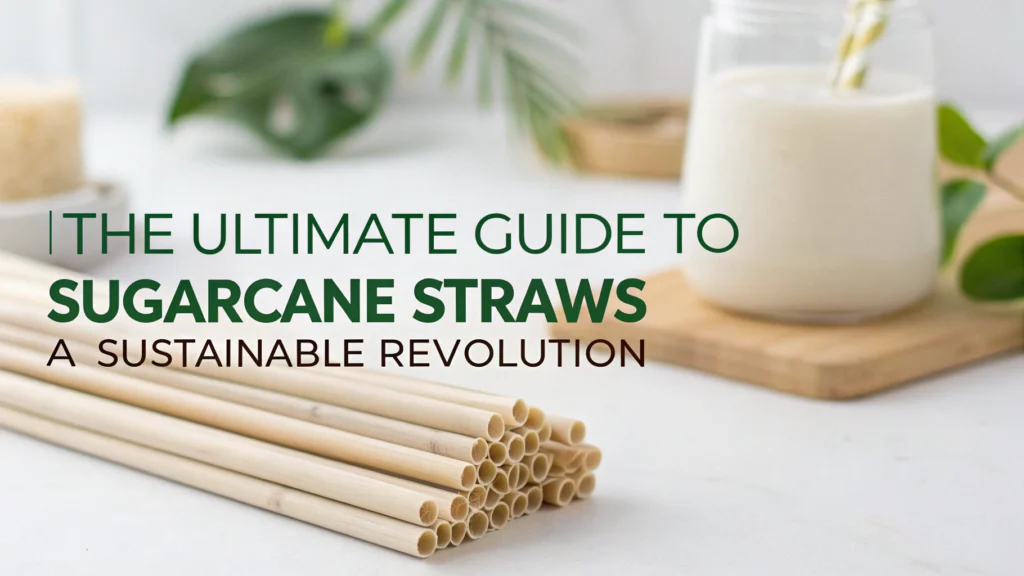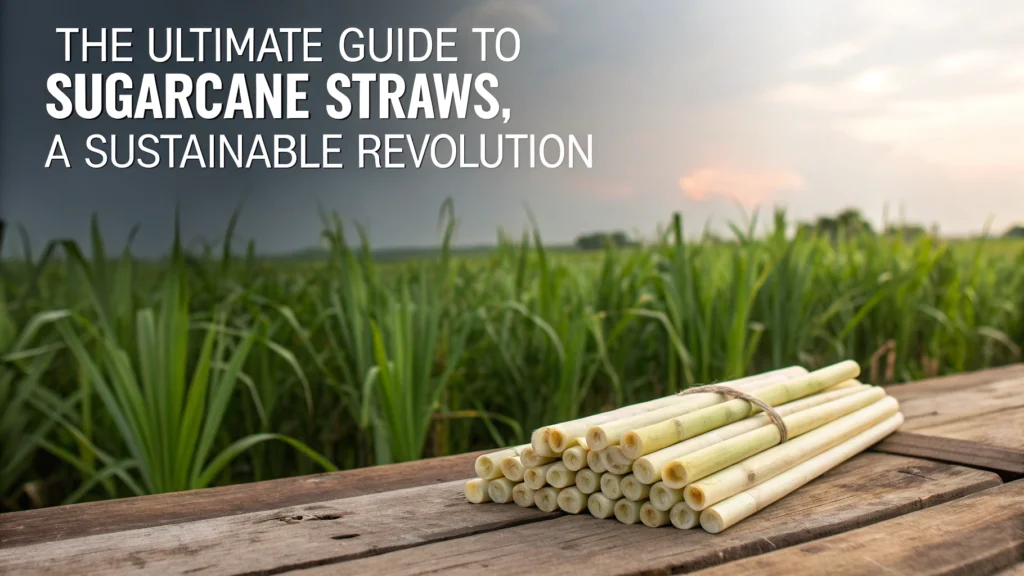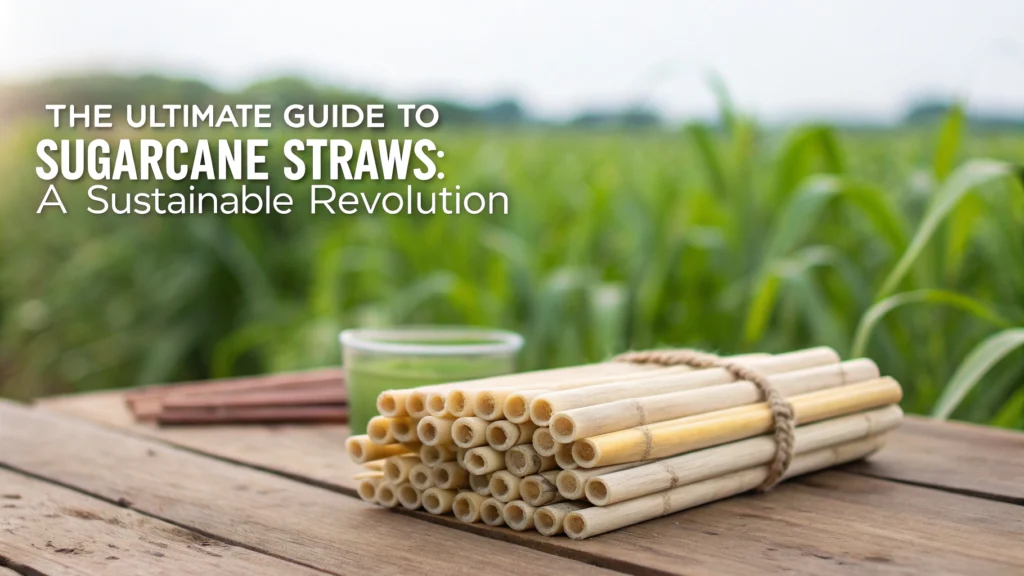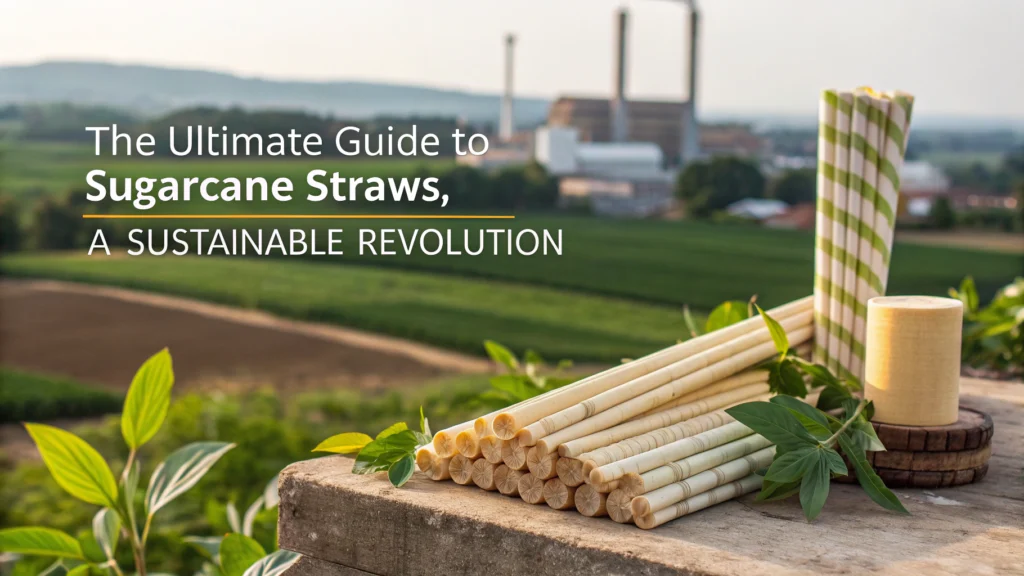The Ultimate Guide to Sugarcane Straws: A Sustainable Revolution in Food Service

Introduction
Discover the environmental and business benefits of switching to sugarcane straws, a key player in sustainable food service solutions.
In an era where environmental consciousness meets business innovation, sugarcane straws have emerged as a game-changer in the sustainable food service industry. With global plastic straw consumption reaching a staggering 500 million units daily in the US alone, the market for eco-friendly alternatives is experiencing unprecedented growth. Industry projections indicate the sustainable straw market will surge to $924 million by 2027, with a compelling 12.3% CAGR [Allied Market Research, 2023].
1. The Science Behind Sugarcane Straws
Environmental Excellence
- Revolutionary Decomposition: While a single plastic straw pollutes our oceans for over five centuries, sugarcane straws return to nature in just 90 days, with a remarkable 90-95% biodegradation rate [Environmental Science & Technology, 2022]
- Climate Impact: Manufacturing processes emit 70% less CO2 than conventional plastic straws, equivalent to taking 150,000 cars off the road annually [Sustainable Materials Research Institute, 2023]
- Water Stewardship: Production requires 60% less water than paper alternatives, saving approximately 2.5 million gallons per million straws produced
Performance That Exceeds Expectations
- Industrial-Grade Durability: Maintains perfect structure for 3 hours in iced beverages and 2 hours in hot drinks (85°C) – outlasting most dining experiences
- Pure Taste Experience: Zero flavor transfer confirmed through double-blind studies with professional taste testers
- Extended Shelf Life: 24-month longevity under proper storage conditions (15-25°C, <60% humidity)

2. Economic Intelligence
Smart Pricing Strategy
Bulk Premium (25,000+ units): $0.018-0.022/straw
Volume Plus (10,000-24,999): $0.02-0.03/straw
Standard (5,000-9,999): $0.03-0.04/straw
Starter (1,000-4,999): $0.04-0.05/straw
Business Impact
- Consumer Preference: 73% of customers actively seek establishments using eco-friendly alternatives, with 64% willing to pay a premium [Consumer Insight Survey, 2023]
- Regulatory Advantage: Future-proof your business against increasing plastic bans across 127 countries
- Cost Efficiency: 40% reduction in waste management costs through biodegradable waste streams

3. Quality Assurance: Beyond Standards
Global Certifications
- FDA Approval (US Food Safety)
- EN13432 (European Biodegrade Standard)
- ASTM D6400 (US Compost Verification)
- ISO 14851 (Biodegradability)
- ISO 22000 (Food Safety Management)
Premium Quality Metrics
- 100% natural bagasse fiber, sourced from certified sustainable farms
- Rigorous heavy metals screening (<1 PPM tolerance)
- ISO 9001:2015 manufacturing excellence

4. Industry Applications & Success Stories
Hospitality Excellence
Case Study: The Ritz-Carlton’s transition to sugarcane straws reduced plastic waste by 2.2 million units annually while enhancing guest satisfaction scores by 18%
Quick Service Innovation
Success Story: A national coffee chain reported 92% positive customer feedback after switching to sugarcane straws, with 30% citing environmental responsibility as a reason for increased visits
Event Management Revolution
Impact Report: Major music festival reduced cleanup costs by 45% and improved vendor satisfaction scores by implementing sugarcane straws across 50 beverage stations



5. Strategic Supplier Selection
Essential Criteria
- Minimum production capacity: 500,000 units/month
- In-house quality control laboratory
- Direct manufacturer relationships
- Transparent sustainability reporting
- Track record of consistent supply chain performance
Required Documentation
- Comprehensive product specifications
- Material safety data sheets
- Current compliance certificates
- Recent facility audit reports
Conclusion
The adoption of sugarcane straws represents more than an environmental choice—it’s a strategic business decision that aligns with global sustainability trends while enhancing operational efficiency and customer satisfaction. As market leaders continue to make the switch, early adopters are positioned to capture significant competitive advantages in their respective sectors.
NatureBioEco Sustainable Solutions:
Your Partner in Eco-Innovation
Contact: Max Jiang
Email: max@naturebioeco.com
WhatsApp: +86 13524105790
Website: www.naturebioeco.com
Market data and specifications current as of 2024. Pricing subject to market fluctuations and order volumes.
Frequently Asked Questions (FAQ)
- What makes sugarcane straws environmentally friendly?
- Sugarcane straws are made from natural bagasse fiber, which decomposes much faster than plastic, reducing pollution and conserving resources.
- How long do sugarcane straws last in drinks?
- Sugarcane straws maintain their structure for up to 3 hours in cold drinks and up to 2 hours in hot beverages.
- Are sugarcane straws safe for all ages?
- Yes, sugarcane straws are FDA approved and safe for consumption by people of all ages.
- Can sugarcane straws be customized for my business?
- Absolutely! Customizable options are available to align with your brand identity and marketing goals.
- What is the shelf life of sugarcane straws?
- Sugarcane straws have an extended shelf life of up to 24 months when stored properly.
- How do sugarcane straws compare in cost to traditional plastic straws?
- Sugarcane straws are competitively priced and offer long-term savings through waste management reductions and customer preference for sustainable options.
- Do sugarcane straws have any taste?
- No, they provide a pure taste experience without transferring any flavor to your drink.
- What certifications do sugarcane straws hold?
- Sugarcane straws are certified by FDA, EN13432, ASTM D6400, ISO 14851, and ISO 22000 standards for safety and environmental compliance.







